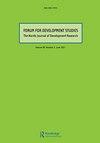像心智一样发散?北欧国家的发展政策
IF 1.1
Q3 DEVELOPMENT STUDIES
引用次数: 0
摘要
摘要发展援助中的“北欧例外论”是众所周知的,其特点是慷慨大方,注重减贫和可持续发展。然而,正如对这一特殊问题的贡献所揭示的那样,各个北欧国家的发展政策差异很大。例如,瑞典和挪威一直将援助额维持在国民总收入的1%以上,而丹麦在新千年将援助预算削减了近三分之一,芬兰一直难以超过0.45%。瑞典一直高度重视减贫,而挪威和芬兰的减贫重点因几个相互竞争的目标而有所淡化,丹麦更是如此。本文比较了北欧四国发展政策的数量、工具和目标。我们发现,如果说在发展援助方面有北欧模式的话,那么在00年代和10年代,当这四个国家分开时,这种模式已经被显著削弱了。我们认为,这些差异背后的主要解释是援助政策背后的特定国内政治联盟,这影响了发展政策的政治化程度。本文章由计算机程序翻译,如有差异,请以英文原文为准。
Diverging Like-Mindedness? Development Policy Among the Nordics
Abstract The ‘Nordic exceptionalism’ in development aid is well known and characterized by its generosity and focus on poverty reduction and sustainable development. However, the individual Nordic countries’ development policies differ significantly, as the contributions to this special issue have uncovered. For example, Sweden and Norway have continuously upheld the volume of aid at above 1 per cent of GNI, while Denmark in the new millennium has cut the aid budget by almost one third, and Finland has struggled to surpass 0.45 per cent. Sweden maintains a strong focus on poverty reduction, whereas Norway’s and Finland’s poverty focus has been diluted somewhat by several competing goals, and Denmark’s even more so. This article compares the volumes, instruments, and goals of the four Nordic countries’ development policies. We find that if there ever was such a thing as a Nordic model in development aid, this model has been significantly weakened in the 00s and 10s, when the four countries have grown apart. The main explanations behind these differences, we posit, are the particular domestic political coalitions behind aid policy, which affect the extent to which development policy is politicized.
求助全文
通过发布文献求助,成功后即可免费获取论文全文。
去求助
来源期刊

FORUM FOR DEVELOPMENT STUDIES
DEVELOPMENT STUDIES-
CiteScore
1.80
自引率
14.30%
发文量
24
期刊介绍:
Forum for Development Studies was established in 1974, and soon became the leading Norwegian journal for development research. While this position has been consolidated, Forum has gradually become an international journal, with its main constituency in the Nordic countries. The journal is owned by the Norwegian Institute of International Affairs (NUPI) and the Norwegian Association for Development Research. Forum aims to be a platform for development research broadly defined – including the social sciences, economics, history and law. All articles are double-blind peer-reviewed. In order to maintain the journal as a meeting place for different disciplines, we encourage authors to communicate across disciplinary boundaries. Contributions that limit the use of exclusive terminology and frame the questions explored in ways that are accessible to the whole range of the Journal''s readership will be given priority.
 求助内容:
求助内容: 应助结果提醒方式:
应助结果提醒方式:


